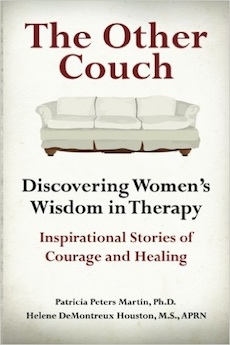By Amy DeLong
The Other Couch: Discovering Women’s Wisdom in Therapy offers a unique opportunity to learn from the wisdom of women collected during two distinguished careers in psychotherapy. Authors Patricia Peters Martin, a clinical psychologist, and Helene DeMontreux Houston, a clinical nurse specialist, draw on their extensive experience as psychotherapists to share the knowledge and wisdom of 36 women, including themselves, that they’ve gathered during their respective careers. The result is an insightful book that brings light to the relationship between therapist and patient, as well as the relationship between the patient and the challenges faced during the course of life.
The book is organized into six sections: relationships, stories of survival, stories of loss, having children, serious illness, and final words. The introduction states that the book’s intended audience is women in their 40s through 70s. As experienced practitioners, Martin and Houston are well-equipped to write about all stages of women’s lives, from young adulthood and marriage, to caretaking, career building and retirement. Therapists and women in the target audience will likely relate to the stories in The Other Couch, but the book’s content is applicable to those with a broader interest in psychology and the complexities of the human relationships.
Each chapter is a window into a crucial juncture in an individual woman’s life, dealing with issues such as infidelity, abuse, caregiving, survivor guilt, panic disorder, addiction, grief, child rearing, and bipolar disorder. Martin and Houston describe how they established a relationship with each patient through therapy and how each grew in the process. For example, in a chapter about overcoming alcoholism, Martin recounts her therapeutic relationship with Lori, a functional alcoholic who grew up with largely absent and abusive parents. Martin received a call from Lori on a Monday night while the therapist was at home preparing goody bags for her daughter’s birthday party at school the next day. Lori had overdosed on vodka and anxiety medication and had paged her therapist after a difficult Mother’s Day. The next day in therapy Lori said that hearing Martin talk about the concrete act of making goody bags and Martin’s devotion to her children had saved her by giving her hope that the world was not an awful place. This is one of many examples of the fine line between the professional and the personal in the therapeutic relationship and the epiphanies and learning that occur on both sides.
In addition to the personal stories of growth, most chapters also include resources and statistics about the topic at hand. For instance, in a chapter about surviving panic disorder, Houston writes about her work with Tammy, a spunky woman with sparkling blues eyes and a blonde pixie haircut who struggled with parenting an alcoholic son and her marriage to an emotionally abusive husband. Tammy had been diagnosed with panic disorder and agoraphobia ten years prior to seeing Houston, and had given up drinking after being prescribed Xanax to treat her anxiety. During the time that Houston took over Tammy’s case, benzodiazepines were falling out of favor due to their potential for addiction; yet, for Tammy they had been instrumental in treating her anxiety and helping her cope with the problems in her life. Tammy credits Xanax for saving her life and enabling her to become independent, and Houston includes her story as an example of a patient who used a potentially addictive medication responsibly and without abuse. Houston includes an informative section on agoraphobia and panic disorder and the medication Xanax at the end of the chapter to educate readers about how the controversial medication can be used successfully and responsibly.
Therapists and women in their middle years have much to gain from The Other Couch, but so do younger women and men who interact with women in the medical, professional, or familial spheres. The Other Couch offers an opportunity to gain empathy, understanding, and knowledge of the human condition, whether or not one has experience as a therapist or patient. Through their writing, Martin and Houston offer tremendous insight into human relationships and the wisdom that has taken many women a lifetime to learn.
Amy DeLong was inducted into Phi Beta Kappa at Rhodes College in 2008. She is a recent graduate of Georgetown University’s master’s program in journalism.




